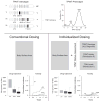Pharmacogenomics in pediatric leukemia
- PMID: 20861736
- PMCID: PMC3612020
- DOI: 10.1097/MOP.0b013e32833fde85
Pharmacogenomics in pediatric leukemia
Abstract
Purpose of review: The therapeutic index of many medications, especially in children, is very narrow with substantial risk for toxicity at doses required for therapeutic effects. This is particularly relevant to cancer chemotherapy, when the risk of toxicity must be balanced against potential suboptimal (low) systemic exposure that can be less effective in patients with higher rates of drug clearance. The purpose of this review is to discuss genetic factors that lead to interpatient differences in the pharmacokinetics and pharmacodynamics of these medications.
Recent findings: Genome-wide agonistic studies of pediatric patient populations are revealing genome variations that may affect susceptibility to specific diseases and that influence the pharmacokinetic and pharmacodynamic characteristics of medications. Several genetic factors with relatively small effect may be combined in the determination of a pharmacogenomic phenotype and considering these polygenic models may be mandatory in order to predict the related drug response phenotypes. These findings have potential to yield new insights into disease pathogenesis, and lead to molecular diagnostics that can be used to optimize the treatment of childhood cancers.
Summary: Advances in genome technology, and their comprehensive and systematic deployment to elucidate the genomic basis of interpatient differences in drug response and disease risk, hold great promise to ultimately enhance the efficacy and reduce the toxicity of drug therapy in children.
Figures

References
-
- Evans WE, Relling MV, Rodman JH, et al. Conventional compared with individualized chemotherapy for childhood acute lymphoblastic leukemia. N Engl J Med. 1998;338(8):499–505. - PubMed
-
- Trevino LR, Yang W, French D, et al. Germline genomic variants associated with childhood acute lymphoblastic leukemia. Nat Genet. 2009;41(9):1001–5. First genome-wide study to identify inherited genome variation associated with the risk of developing ALL in children. . Although genome-wide analyses have identified somatic alterations contributing to the pathogenesis of pediatric acute lymphoblastic leukemia (ALL), this was the fist study to identify germline variants associated with a higher risk of developing childhood ALL. - PMC - PubMed
-
- Papaemmanuil E, Hosking FJ, Vijayakrishnan J, et al. Loci on 7p12.2, 10q21.2 and 14q11.2 are associated with risk of childhood acute lymphoblastic leukemia. Nat Genet. 2009;41(9):1006–10. Genome-wide study assessing the role of inherited alleles in ALL pathogenesis. This paper identified the same genes as Trevino et al [4], with almost identical odds ratios for developing ALL in children. - PMC - PubMed
Publication types
MeSH terms
Substances
Grants and funding
LinkOut - more resources
Full Text Sources
Research Materials

